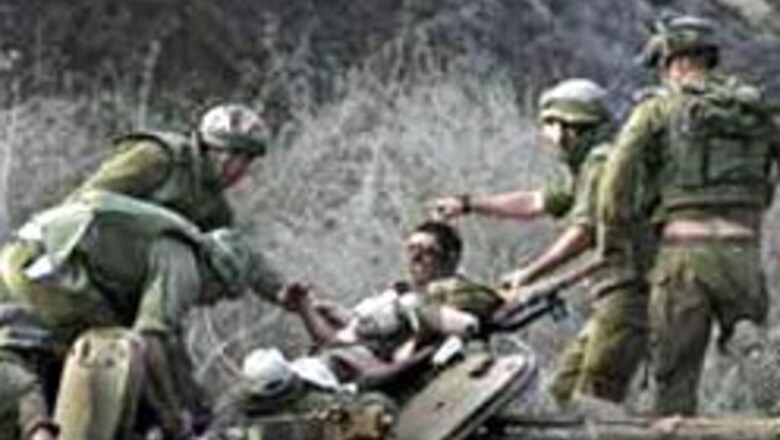
views
Israel-Lebanon Border: As ceasefire negotiations appeared to stall, Israel lobbed artillery rounds into southern Lebanon early on Thursday while troops backed by tanks and armored vehicles moved across the border.
In Israel, Hezbollah rockets on Thursday killed two people, one of them a child.
According to Lebanese military sources and UN observers, a vicious battle broke out between Israeli troops and Hezbollah fighters in Khiyam, which Israel says is a Hezbollah stronghold.
In a written statement, the Israel Defense Forces said Hezbollah had been firing rockets from Khiyam into the Israeli cities of Metula, Kiryat Shmona and the Galilee panhandle.
A spokeswoman for the Jewish state said the offensive was not part of an expanded campaign that Israel's Security Cabinet had approved on Wednesday.
"It's a small operation that looks large from where we're looking right now, but this is not opening up any new front," spokeswoman Miri Eisen said. "It's taking care of one that has been consistently hitting Kiryat Shmona."
West of the panhandle, dozens of Israeli soldiers were injured during fighting around Bint Jbeil, Lebanon, where Israeli troops have battled militants for much of the four-week conflict, the IDF reported.
The IDF also reported that it sustained other casualties in the Lebanese towns of Aita Al-Shaab and Debel. At least 15 soldiers were killed in fighting, the most Israel has lost in a single day since the fighting began, the IDF said.
As of 3 pm (8 am ET) Wednesday, Hezbollah had fired 160 rockets into northern Israel, 22 of which landed inside cities, according to Israeli police.
North of the border, Israeli airstrikes again hammered the Beirut suburb of Haret Hreik, once home to Hezbollah headquarters, according to the Lebanese Army.
On Thursday, two Israeli civilians - including a child - were killed and two were wounded after Hezbollah militants launched a Katyusha rocket into the village of Deir al Assad in northern Israel, ambulance service officials said.
Lebanese Internal Security Forces announced on Thursday that 834 people have been killed and 3,211 wounded since fighting began on July 12.
The Israel Defense Forces reported on Wednesday that 120 have been killed - including 38 civilians - and more than 700 wounded.
EXPANDED CAMPAIGN OKAYED
The Israeli Security Cabinet on Wednesday approved an expanded offensive in which Israeli troops could push up to the Litani River, 18 miles inside Lebanon.
The decision is pending final approval from Prime Minister Ehud Olmert and Defense Minister Amir Peretz, according to the prime minister's office.
About 10,000 Israeli troops are on the ground in southern Lebanon, according to Israeli military analysts.
Hours after the Cabinet made its decision, Hezbollah leader Hassan Nasrallah appeared on Al-Manar television, threatening to turn southern Lebanon into "a graveyard" for the Israelis.
"I say to the Zionists, you could come anywhere, invade, land airborne forces, enter this village or that, but I repeat, all this will cost you a high price," he said.
He added that the Israeli military offensive has yet to diminish the Islamic militia's military capabilities.
"We will fight until the last bullet, as long as there's a grenade, as long as there's a rocket, there will still be fighting," he said.
The United States, an Israeli ally and chief supplier of the Jewish state's weapons, warned both sides on Wednesday against enlarging the conflict.
"The escalation is something that we do not want to see," White House spokesman Tony Snow said. "But also, you have to have a resolution that addresses the root cause of Hezbollah, has a practical solution to making sure that the Lebanese government will be able to have military and political control of the south."
DIPLOMACY DELAYED
As the fighting raged, senior White House officials said it did not appear likely that a vote would come Thursday on a UN resolution to end the conflict.
The United States and France, which offered a draft resolution Saturday, were trying to agree on certain segments of a revised draft, officials said.
One point of contention is a Lebanese proposal, backed by the Arab League, that calls for Israel's immediate withdrawal from Lebanon.
Israel says it won't leave Lebanon until it can guarantee security on its northern border.
There is also some disagreement on the timing of a deployment of Lebanese and UN troops to the region.
The United States says it is pushing for "flexibility" so Israel can monitor the deployment before pulling out, a position the Israelis favor.
"We will leave, and we will be happy to withdraw the minute the area has been stabilized, the minute the international presence will make sure that the Hezbollah has been removed and disarmed," said Israel's ambassador to the United Nations, Dan Gillerman.
But Lebanon and the Arab League want an "ironclad" commitment to a full Israeli withdrawal, said Arab League Secretary-General Amr Moussa.
Gillerman also said he had problems with the idea of a UN force being deployed to stabilize the region, and he pointed to the UN Interim Force in Lebanon as an example.
"This interim period has lasted 28 years," he said. "It's an interesting time frame for an interim force. During that time it has been totally incompetent, impotent, in preventing any terror attacks against Israel."
Both the US-backed draft resolution and the Lebanese proposal call for an international peacekeeping force. But the US-French resolution does not call for Israel's withdrawal.
Lebanon also is proposing to deploy 15,000 of its troops to the border, an offer the United States called "significant."
"Everybody wants to see this used to transform the situation in the region, which means fundamentally that we don't want Hezbollah to reinfiltrate the southern part of Lebanon," said US Ambassador to the United Nations, John Bolton.



















Comments
0 comment